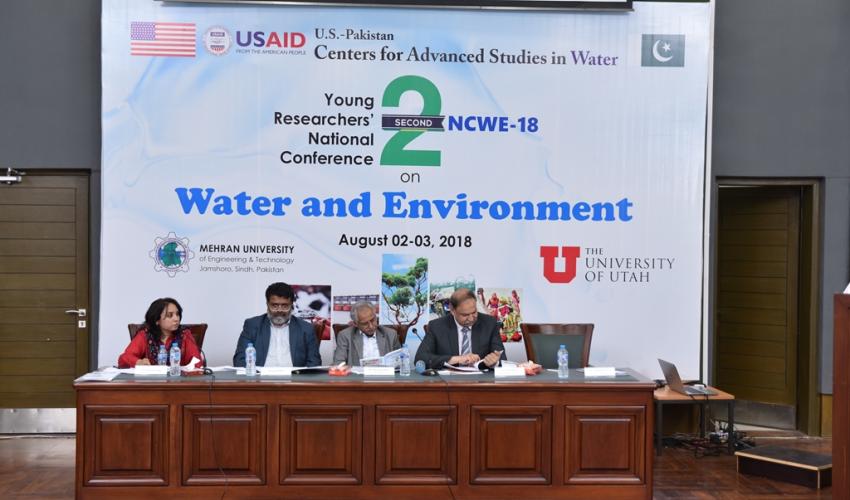Two-Day 2nd Young Researchers’ National Conference on Water and Environment, held at U.S.-Pakistan Center for Advanced Studies in Water (USPCAS-W) at Mehran University of Engineering & Technology (MUET) Jamshoro in early August. The conference also accompanied different technical sessions highly knowledgeable for the participants.
On the first day, Vice Chancellor MUET Dr Mohammad Aslam Uqaili speaking in the inaugural session said that learning is continuous process leads not only to know the problems of the communities but offer the sustainable solution based on the applied research and knowledge transformation. He said the community is the ultimate beneficiary from the academic research and particularly from the academic research in water, energy and agriculture sector.
Dr Uqaili said that triple helix model had been replaced by the quadruple helix model in which the role of communities included in academia-industry-government relations.
He said that three years back the MUET was selected to establish national water research center with the financial support of American people through the United States Agency for International Development (USAID) to contribute solutions to Pakistan’s water-related challenges by educating and training the next generation of water sustainability leaders.
He further said that this young researchers’ national conference is one of the nice initiatives taken by the Center last year and it will be continued further.
Conference Convener Dr Kamran Ansari said that the conference aims to provide an ideal academic platform to young researchers and scholars from all over the country to present, share and exchange their latest findings of water and environment related issues.
Dr Rasool Bux Mahar presented the vote of thanks and thanked all the participants for joining in the conference.
Mr. Nisar A. Memon, the former Federal Minister & Senator, speaking as the Chief Guest at the closing ceremony said that only knowledge based society can bring socio-economic development with a people-centric approach where our National Water Policy 2018 and Climate Change Policy 2013 is thoughtfully and meticulously implemented and this is the way forward for us to be not only secure but sovereign country. Nisar Memon said that Pakistan currently has the largest youth population of its history and quoting the United Nation’s Human Development Report said that, it has 64% of its 207 million population below the age of 30 and 29% between 15-29 years. “But our challenge is to nurture the youth and offer them the opportunities.” he observed. He said that the conference paved the way for the youth researchers to present their research work, learn from peers and participate in national research endeavors.
Dr. Bakhsha Lashari, the project director USPCAS-W MUET presented thirty two (32) recommendation of the two-day conference recommending develop policies for regulating the use of ground water, effective implementation of national water policy be made, to bring improvement in the irrigation system which can save water equivalent to one dam. While sharing the recommendation, he stressed on the institutional audit of the water resources be conducted on a periodic basis to help planners and administrative bodies to make informed decisions and on irrigation infrastructure be modernized and equipped to manage water resources properly. He also recommended for the promotion of behavioral change to reduce wastage of water by raising public awareness through media campaigns and incorporating water conservation lessons in syllabi/curricula at primary, secondary and tertiary levels.
Earlier to the closing ceremony, in plenary session Muhammad Abid, World Bank Water Resource Specialist delivering his presentation on Balochistan Integrated Water Resource Management and Development Project said that before implanting of the project one has to design and then refer the Project Development Objective (PDO). He said that under the World Bank titled project the 100 small dams are being development in different location in the province as to provide water for domestic and agriculture use.







